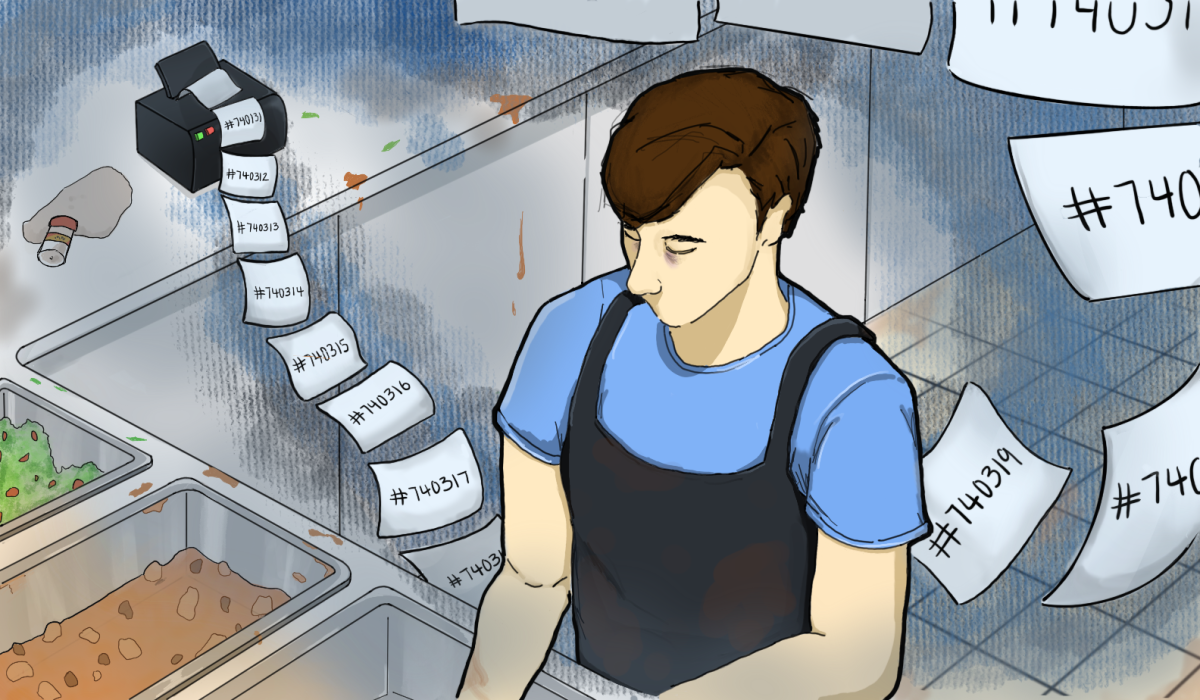For many years, the number of Housing Dining Hospitality employees at UC San Diego has dwindled. The amount of work HDH must complete is significantly disproportionate to the amount of student workers they have available, especially with the rising student population. Students seem dissatisfied with HDH’s labor force due to workers’ hindered ability to perform their job adequately. Student workers in dining halls and college markets describe severe and intolerable stress in the workplace, while receiving minimal compensation. To eliminate this exploitation, HDH should offer student employees dignified wages that express staff appreciation and give students incentive to continue employment. Higher wages have the ability to foster current student employees’ well-being in addition to alleviating the general burden of HDH staff with improved employee retention.
Under severe increases in demand for the labor HDH produces, UCSD has stretched its limited staff incredibly thin. The “UCSD Work Survey” conducted in 2022 for the Student Affairs sector shows that workers agree that staffing is not adequate, with an “Adequate Staffing” rating of 2.62 out of 5. This understaffing has caused a significant increase in existing staff members’ workloads. In the same poll, the “Appropriate Stress with My Job” category scored a 3.44 and “Total Compensation” received a 2.88, both on a scale of 0 to 5. This worker dissatisfaction is not a new phenomenon, as a labor strike regarding poor working conditions in the 64 Degrees dining hall was initiated by student employees in September 2021. Strike participants argued that HDH management created “inadequate working conditions that [left them] overworked and stressed, hindering [their] ability and desire to continue working.”
Scientifically, overburdened labor contributes to diminished employee mental health. A study published in the National Center for Biotechnology Information concluded that the overexertion of a worker’s labor offers a variety of emotional consequences such as “anxiety, depression, dissatisfaction with life,” and “low self-esteem.” Such consequences lead to “a psychological distance from work” and a minimization of employee efficiency. By this logic, the rigorous overworking of available HDH workers fuels the system’s demise. With this mental turmoil and workplace toxicity, student workers have been unable to produce the efficiency that is expected of them.
In turn, student customers are expressing dissatisfaction with the quality of these fundamental services, duly highlighting the inefficiency and inconvenience of HDH. Upon recent assessment from UCSD’s 2023 “Student Satisfaction Survey,” the Dining Services department received an average satisfaction score of 3.23 out of 5, the lowest of the other 35 polled departments. A lower satisfaction score of 3.11 was specifically allotted for “Speed of Service.”
However, it is a mistake to attribute this to the dining hall workers. The ever-increasing student body, combined with short-staffed dining departments, creates an unbalanced relationship between orders and the ability to fulfill them, causing wait times that are often over an hour long. This is not representative of worker incompetence, but rather the heavy workload a limited staff must accommodate. The issue has become exacerbated in recent years by the integration of online orders through the Triton2Go app. HDH fails to regulate the amount of online orders placed, leading to a considerable workload for dining employees. In 2018, prior to the app’s release, Thurgood Marshall College’s HDH representative, Brandon Milledge, expressed concern over the app’s integration: “HDH employees at some dining halls are already overworked and understaffed, so adding this additional service feels like just another weight on employees’ shoulders.” Milledge’s concerns have proved to be valid. An article The UCSD Guardian published in 2021 stated that “[The] Triton2Go app overwhelmed workers as 100 to 200 orders were placed simultaneously.” Such workplace anxiety inflicted by Triton2Go’s demand is unfair and exploitative, pushing an already fractured system.
Furthermore, there is a proven correlation between employee wages and employee productivity. Higher wages would relieve much of staff’s fiscal burden, in turn promoting a more productive and satisfied staff. With the reduction of stress and implementation of competitive wages for HDH workers, worker retention may improve, encouraging potential applicants to seek out HDH positions.
The UC system has the resources to promote staff stability and improve the student dining experience by offering staff a respectable wage for the work they do. Currently, UCSD offers student workers a starting wage of $16.50, a low compensation rate far from a livable wage. Meanwhile, an abundance of the university’s funding goes towards UC executives through granted pay raises as well as strong six-figure salaries. In April of this year, Chancellor Pradeep Khosla received a $500,000 pay raise simply as an incentive to continue on as UCSD’s Chancellor. Khosla is now on a yearly salary of $1.14 million. The Chancellor was granted this immense raise from a $13 million anonymous donation, yet this private fund expresses a larger systemic issue of worker inferiority that UC incorporates into campus morals. While prominent UC executives do play a vital role in our university’s operability, salary boosts to an already six-figure value is a direct insult to our struggling front-line student workers.
The indisputable, immoral product of wage labor should not be perpetuated by a university system built to encompass intellectual and ethical campuses. As educated and upstanding students, we should acknowledge this issue as exploitative. A call for advocacy is crucial to the financial security of our fellow peers and the repair of a damaged system.






















